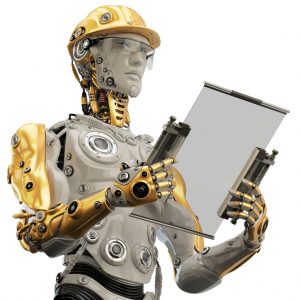Join our online community and be inspired to achieve your goals!
VIEW OUR FACEBOOK PAGEThe future of work – will robots replace us all?
Digital technology has already reinvented the way people work but there’s more to come amidst a constantly changing technology landscape. As individual tasks increasingly become automated, jobs are being redefined and re-categorised but will robots eventually replace us? Or will we reach a point where people and machines work alongside each other?
With the concept of work changing at this ever-increasing pace and more individual tasks becoming automated through machines, artificial intelligence (AI) and other technologies, jobs are being redefined. Some experts predict we are on the cusp of the fourth industrial revolution with changes marked by mind boggling advances in digital, physical and biological technologies set to revolutionise our future.
As our workplaces continue to rapidly evolve, it’s clear we need to develop new skills to keep pace with the change. Much of the research conducted on this topic suggests that robots won’t (and can’t) replace us altogether (at least not in our lifetimes). With many jobs lost to automation replaced by new ones, jobs aren’t being replaced at the rate some predicted several years ago. In fact, research commissioned by technology company Infosys and presented at the World Economic Forum last year revealed that 72% of workers whose jobs are effected by AI will be redeployed within the same area of their organisation (34%) or retrained for another area (38%).
What the research shows is that robotics and/or AI are being used to automate routine and mundane tasks, resulting in large scale reclassification of work. However, the resulting value of that automation means people are freed up to focus on higher value work that can only be done (at the moment) with human imagination. While new jobs are being created by AI, particularly in the field of robotics, it’s impossible to predict exactly where jobs will emerge and what skills will be needed.
Digital technology has already completely reinvented the way we work, however while many industries have activities with potential for complete automation, many do not. In addition, other factors will influence whether tasks will be automated completely or partially. These include the technical feasibility, costs involved, scarcity or abundance of existing skills to do the work, the costs of workers who would otherwise do the work, benefits beyond labour cost savings (such as improved performance), and regulatory and/or social acceptance considerations. We do know that workers involved in areas requiring more creative and imaginative skills will remain in demand. Examples include jobs where you need to: manage others and/or interact with stakeholders; apply expertise to make decisions or plan, create or innovate; complete physical work and operation of machinery in unpredictable environments; and many areas of healthcare and social assistance.
Skills such as problem solving, critical thinking, empathy, innovation and creativity, collaboration, leadership and a service focus are becoming more important. The ability for workers to be adaptable in developing new skills, and be willing and able to work along-side automation or machines will become more important. The flexibility to move to other areas will drive future success and this will largely fall to the individual to acquire these new skills or retrain in new areas.
If you are looking to advance your career, you may have already identified the areas you need to gain more experience; or the knowledge you need to develop in order to progress. With the future set to bring such staggering change and advancements – think about what areas you could develop more relevant skills in.
Would you like assistance from a Career Coach to identify areas where you might be able to improve your career? If so, please see our Career Counselling Services.


